WHEELS OF INDUSTRY.
Page 4
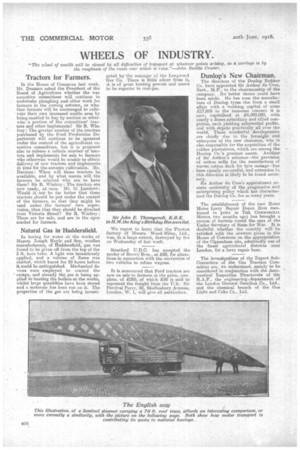
Page 5
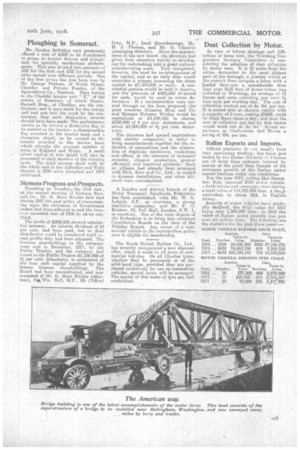
Page 6
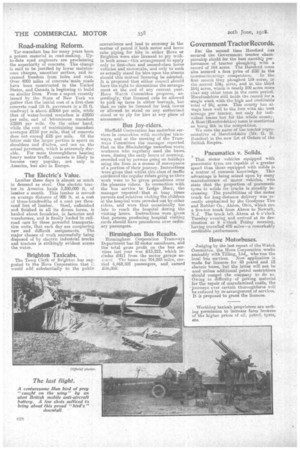
Page 7
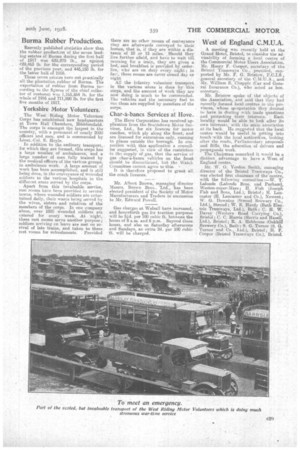
Page 8
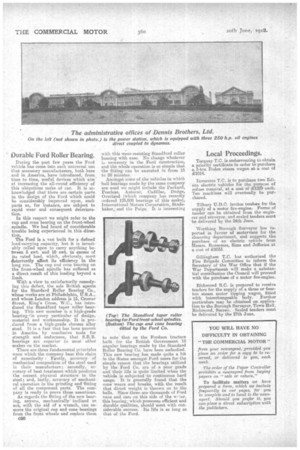
If you've noticed an error in this article please click here to report it so we can fix it.
Do wheel of wealth will be slowed by all difficulties of transport at whatever points arising, as a carriage is by
Tractors for Farmers.
In the House of Commons last week, Mr. Denman asked the President of the Board of Agriculture whether the war executive committees will continue to undertake ploughing and other work for farmers in the coming autumn, or whether farmers will be encouraged to cultivate their own increased arable area by being enabled to buy by auction or otherwise a portion of the committees' tractors and other implemental Sir R. Winfray: The greater number of the tractors purchased by the Food Production Department will continue to be operated under the control of the agricultural executive committees, but it is proposed also to release a certain number of tractors and implements for sale to farmers who otherwise would be unable to obtain delivery of new tractors and implements in time for the autumn cultivation. Mr. Denman: When will those tractors be available and by what means will the farmers 'be selected who are to. have them? Sir R. Winfrey; The tractors are now ready, at 'once. Mr. G. Lambert: Would it not be far better that these tractors should be put under the control of the farmers, so that they might be used under_ the farmers' own supervision,than that they should be directed from Victoria Street? Sir R. Winfrey; These are for sale, and are in the open market for farmers.
Natural Gas in Huddersfield.
In boring for water at the works of Messrs. Joseph Hoyle and Son, woollen manufacturers, of Huddersfield, gas was found to be given off from the top of the 2 ft. bore tube. A light was incautiously applied, and a volume of flame was started, which burnt for 20 hours before it could be extinguished. Mechanical devices were employed to control the ' escape, and already the gas is being applied to heating the boilers a.t the works, whilst large quantities have been stored and a motorcar has been run on it. The properties of the gas are being investi
gated by the manager of the Longwood Gas Co. There is little odour from it, it is of great heating powers and seems to be superior to coal-gas.
We regret to learn that the Preston factory of Messrs. Wood-Milne, Ltd., was, to a large extent, destroyed by fire on Wednesday of last week.
Stretford U.D.C. has accepted the tender of Brown Bros., at £50, for alterations in connection with the conversion of two vehicles to refuse wagons.
It is announced that Ford tractors are now on sale to farmers at the price, complete, of £250, of which £80 is said to represent the freight from the U.S. Sir Percival Perry, 59, Shaftesbury Avenue, London, W. 1, will give all particulars.
Dunlop's New Chairman.
The directors of the Dunlop Rubber Co. have appointed Sir Arthur du Oros, Bart., M.P., to the chairmanship of the company. No better choice could have been made. He has seen the manufacture of Dunlop tyres rise from a small affair with a working capital of some £17,000 ta the immense concern it is now, capitalised at £6,000,000, with nearly a dozen subsidiary and allied companies, each yielding substantial profits, and with depots practically all over the world. These wonderful developments are chiefly de to the foresight and enterprise of the new chairMan, who is also responsible for the acquisition of the rubber plantations, which are among the Dunlop Co.'s greatest assets. Another of Sir Arthur's schemes—the provision of cotton mills for the manufacture of woven cotton duck for tyre casiags—has , been equally successful, and extension in this direction is likely to be found necessary. Sir Arthur du Cross appointment ensures continuity of the progressive and enterprising policy which has characterized the Dunlop Co. for so many years.
The establishment of the new Home Motor Lorry Repair Depot (first mentioned in print. in THE COMMERMIL MOTOR two months ago) has brought a swarm of hornets round the ears of the Under Secretary of State for War. It is doubtful whether the country will he satisfied with the answers given in the House of Commons on the appropriation of the Cippenham site, admittedly one of the finest agricultural districts near London, for a lorry repair base.
The investigations of the Expert SubCommittee of the Gas Traction Committee are, we understand, mainly to be considered in conjunction with the Aeronautical Inspection Directorate of tile R.A.F., the engineeringe department of the London General Omnibus Co., Ltd., and the chemical branch of the Gas Light and Coke Co., Ltd.
Ploughing in Somerset.
Mr. Gordon Selfridge very generously offered a sum of £500 to be destributed in prizes to tractor drivers and ploughmen for specially meritorious performances. This sum divided into amounts of £50 for-the first and £33 for the second prize spread over different periods. One of the first prlzes has just been won by Mr. George Parsons, of North Street, Cheddar, and Private Pemble, of the Agricultural Co., Taunton. They belong to the Cheddar tractor unit "E," of the county of Somerset, of which Messrs. Burnell Bros., of Cheddar, are the eontrectors, and it says much for the energy and zeal put into the -work by the contractors that such distinctive awards should have been made. The performance carries as its reward a distinctive flag to be carried on the tractor: a championship flag awarded to the tract-or team and a champion shield, to be carried on the tractor awarded to the tractor team whit% ploughs the greatest number of acres. in England and Wales. , A small silver reprca of this shield will also be preeente.d to each member of the winning team. The total acreage dealt with by the whole unit in the Axbridge and Wells district is 2010 acres ploughed and 1873 , cultivated.
Siemens Progress and Prospects.
Presiding on Tueedaye the 11th inst., at, the annual meeting of Siemens Bros. and Co., Mr, G. Mure Ritchie Said that during 1917 the past policy of concentrating upon the execution of Government orders had been adhered to and the turnover exceeded that of 1916 by about onethird.
The profit of £208,524 showed substantial increase. An interim dividend of 10 per cent, had been paid, but no final distribution could be considered until excesg profits duty had been adjusted. The German shareholdings in. the company were sold in December, 1917, by the Public Trustee, and the company had iesued to the Public Trustee £1,330,000 of 4,1 per cent, debentures, in settlement of the loan cash capital supplied by the former German shareholdings. The Beard had been reconstituted, and now consisted of Mr. G. Mure Ritchie (cRairman), SW m. Bull, M.P., Six Clifford Cory, M.P., Lord Queenborougn, Mr. H. J. Thomas and Mr. G. Chauvin (managing direCtor). Since the appointment of the new board, the directors had given their attention mainly to deYelopnig the undertakieg into a great national manufacturing asset. They recognized, however, the need foi re-arrangement of the capital, and at an early date would enunciate a scheme increasing the share capital to £1,500,000 or snore. A suhetantial portion would be beld in reserve, but the proceeds of £400,000 ifs issued for cash, would be used to retire dehentures. If a reconstruction were carried through on the lines proposed, the joint concerns (Siemens Bros. and Co. and Siemens Dynamo Works) would be capitalized at £1,000,000 in shares, £150,000 of 4 per cent. debentures, and about .£1,000,000 of 4/ per cent. debentures.
The directors had opened negotiations with similar companies, in order to bring manufacturers together for the reduction of competition and the elimination of duplicate machinery, workshops and offices, in the interests of increased economy, cheaper production, greater efficiency, and improved products. Such an alliance had already been arranged with Dick, Kerr and Co., Ltd., in regard to dynamo installations, and other alliances were contemplated.
A London and district branch of the Motor Transport Employers . Federation has been established, with Mr. W. G. Lobjoit, 3.P., as chairman, a strong executive committee, and Mr. F. -a-. Bristow, 83, Pall Mall, London, S.W. '1, as secretary. One of the main objects of the Federation is to bring into existence Conciliation Boards on the lines of the Whitley Report. Any owner of a corn' mereial vehicle in the metropolitan police area is eligible for membership.
The North British Rubber Co., Ltd., 'has recently inaugurated a new discount offer, which is made to alLesers of commercial vehicles. On all Clincher tyres, whether they be pneumatic or of the solid-band type, provided they are purchased exchleively for use on commercial vehicles, special terms will be arranged. The merits of this make of tyre are well established.
Dust Collection by Motor.
In view of labour shortage and iliffi`-eulties of horse hire, the Woething Corporation Sanitary Comniittee is considering the adoption of dust collectionby motor vans. It is 31 miles from the refine destructor to the most distant part of the borough, a journey which at the present time occupies a. horse with a, loaded' dust-cart a considerable time
Last year 9500 tons house, refuse was collected in Worthing, an average A-el; 11 horses and carts collecting just over tons each per working day. The cost of collection worked out at 6s. 6d. per ton. It is stated that an electric vehicle with a capacity of 2 tons, costing 21033, could be filled three times a day, and that the cost of collection per ton by this .means -would work out at 5s. 6d. Actual experience at Cheltenham had.1-hown a saving of 106. per ton.
Italian Exports and Imports.
Official. statistics do not usually form very convincing reading; but those just issued by the Italian Ministry of Finance are of more than ordinary interest by reason of the proof they furnith of the enormous growth of the Italian motor export business under war conditions. For the year 1917, ending 31st Deeem ber, Italy exported 8734 motor vehicle; —both lorries mid passenger cars—having a total Amine of 114,978,605 liras. A limes equivalent to about 10d. in English money.
;Imports of motor vehicles have gradually declined, the total value for 1917 being only 1,369,900 liras; in 1913 the valuO of -Italian motor imports was just over six million liras. The following are the statistics for the past three years :
MOTOR VEHICLE EXPORTS FROM ITALY.
Road-making Reform.
Tar-macadam has for many years been a potent material in road-making. Upto-date read engineers are proclaiming the superiority of concrete. The change is said to be justified by lower maintenance charges, smoother surface, and increased freedom from holes and ruts. Over 4000 miles of concrete-main roads have been constructed in the United States, and Canada is beginning to build on similar lines. From a report recently issued by the State of New York we gather that the initial cost of a first-class concrete road (16 ft,. pavement in a 25 ft. roadway) is about £3064 per mile, while that of water-bound macadam is £2050 per mile, and of bituminous macadam £2594 per mile. On the other hand, while the cost of maintaining macadam averages £210 per mile, that of concrete does not exceed £26 per mile. Of the latter sum the larger portion is spent on shoulders and ditches, and not on the actual pavement, which is extremely dur
able. For main thoroughfares bearing heavy motor traffic, concrete is likely to become very popular, not only in America, but also in Europe.
The Electric's Value.
Lumber these days is almoat as much in demand as steel. One electric tractor . in America hauls 3,350,000 ft. of lumber a month. This lumber is moved, an average distance of 900 ft. at a cost of three-hundredths of a cent per thousand feet of lumber. Steel, unfinished and finished in all its divers forms, is hauled about foundries, in factories and warehouses, and is finally loaded 'in railroad cars by these powerful transportation units, that each day are conquering new and difficult assignments. The major classes of work successfully being disposed of by electric industrial trucks and tractors is strikingly evident across the water.
Brighton Taxicabs.
The Town Clerk of Brighton has s9gestecl to the Hove Corporation that would add eabstantially to the public
convenience and lead to economy in the matter of petrol if both motor and horse cabs plying for hire in either Hove or Brighton were also licensed to ply within both areas—this arrangement to apply only to first-class and 6econd-cla.ss horse vehicles and motorea.bs, and only to such as actually stand for hire upon the streets should this mutual licensing be adopted. It is proposed that either council should have the right to discontinue the arrangement at the end of any current year. Hove Watch Committee proposes accordiugly, that licensed cabs be allowed to pick up fares in either borough, but that no cabs be licensed for both towns or allowed to stand on any authorized stand or to ply far hire at any place of amusement.
Bus Joy-riders.
Sheffield Corporation has inotorbui.services in connection with municipal tramways, and at the meeting of the Tramways Committee the manager reported that on the Stocksbridge motorbus route workmen who regularly used the buses were, during the early hours of morning, crowded out by persons going on holidays using the lines as a means of conveyance of a portion of their journey. Instructions were given that whilst this class of traffic centinued the regular riders going to their work were to be given precedence over the pleasure riders. In connection with the bus service to Lodge Moor' the manager reported that at busy times parents and relatives visiting the children at the hospital were crowded out by other riders, and were thus occasionally too late to reach the hospital during the visiting hours. Instructions were given that persons producing hospital visiting cards should have precedence over ordinary passengers.
Birmingham Bus Results.
Birmingham Corporation Tramways Department has 52 motor omnibuses, and the total gross profit on the bus services last. Year was £13,212,which includes ...£41i from the motor garage acemelt The buses ran 764,293 miles, carried 6,468,595 passengers, and earned R66,809.
Government Tractor Records. ,
Fol the second time Hereford has secured the Government tractor championship shield for the best monthly performance of tractor ploughing with a record of 164 acres. The Hereford team also secured a first prize of £50 in the
liordon-6esiriage competition. In the first month they ploughed 155 acres, us the second 13(4 acres, and in the third 164i acres, which is nearly 100 acres more than any other team in the same period. Herefordshire still holds the record for a single week with the high and creditable ' total of 841 acres. This county has always been well to the fore with the nest acreage per tractor, not only for individual teams but for -the whole county. A Ross '(Herefordshire) team is mentioned as being 8th in the competition. We note the name of the tractor r4p.reseiltative of Herefordshire (Mr. G. H. Hatcher) in the new list of Orders of the British Empire.
Pneumatics v. Solids.
That motor vehicles equipped with pneumatic tyres are capable of a greater speed than those equipped with solids is a matter of common knowledge. This advantage is being seized upon by many manufacturers of motor vehicles, who state that the proportion of pneumatic tyres, to solids for trucks ia steadily increasing. The possibilities of the motor truck for long-distance delivery was re. cently emphasized by khe Goodyear Tire and Rubber Co., Akron, Ohio, which ran a five-ton truck from Akron to Newark, N.J. The truck left Akron at 6 o'clock Tuesday evening and arrived at its destination at 9 o'clock Friday morning, having travelled 475 miles—a remarkably creditable performance.
• Hove Motorbuses.
Judging by the last report of the Watch Committee, the Hove Corporation works amicably with Tilling, Ltd, who run the local bus services. Now application is made for licences for 49 petrol and 12 electric buses, but the latter will not be used unless additional petrol restrictions should compel the company to do so. Owing to difficulty of getting material for the repair of macadamized roads, the -journeys over certain thoroughfares will . be reduced by re-arrangement of services. It is proposed to grant the licences.
Worthing taxicab proprietors are seeking permission to increase fares because of the higher prices of oil, petrol, tyres, etc.
Burma Rubber Production.
Recently published statistics show that the rubber product:on of the seven leading estates of Burma during the first half of 1917 was 635,978 lb.,. as against 429,463 lb. for the corresponding period of the previous year, and 445,150 lb. for the latter halt of 1916.
These seven estates turn out practically all the plantation rubber of Burma. The exportation of rubber from Burma (according to the figures of the chief collector of customs) was 1,165,354 lb. for the whole of 1916 and 711,990 lb. for the first five months of 1917. •
Yorkshire Motor Volunteers.
The West Riding Motor Volunteer Corps has established new headquarters at Town Hall Chambers, Huddersfield. The corps is amongst tbe largest in the country, with a personnel of nearly 2000 officers and men, and is commanded by Lieut.-Col. E. Hoyle. In addition to the ordinary transport,. for which they are formed, this corps has a large number, of ambulances, and a large number of men fully trained by the medical officers of the various groups, in ambulance work. A large amount of work has been accomplished, and is still being done, in the conveyance of wounded soldiers to the various hospitals in the different areas served by the corps.
Apart from this invaluable service, rest rooms have been provided in several towns, where wounded soldiers are entertained daily, their wants being served by the wives, sisters and relatives of the members of the corps. In one company alone, over 1000 wounded soldiers are catered for every week. At 'night, these rest rooms serve another purpose; Soldiers arriving on leave are met on arrival of late trains, and taken to these rest rooms for refreshments. Provided
there are no other means of conveyance they are afterwards conveyed to their homes; that is, if they are within a distance of 10 or 15 miles. Should they live further afield, and have to wait till morning for a train, they are given a bed, and breakfast is provided by orderlies, who are on duty every night; in fact, these rooms are never closed day or night All the infantry volunteer transport in the various areas is done by this corps, and the amount of work they are now doing is much to he commended. The vehicles and the necessary fuel to run them are supplied by members of the pups.
Char-a-bancs Services af Hove.
The Hove Corporation has received-application from the Southdown Motor Services, Ltd., for six licences for motor coaches, which ply along the front, and are licensed for excursions only, running to places outside the borough. In connection with this application a councillor suggested, in view of the restriction in the supply of gas, that the service of gas• char-is-banes vehicles on the front should be discontinued, but the Watch Committee cannot agree to this.
It. is therefore proposed to grant all the coach licences.
Mr. Albert Brown, managing director Messrs. Brown Hrw., 'it& has been elected president of the Society of Motor Manufacturers and Traders in succession to Mr. Edward Powell.
Gas charges at Walsall have increased, and henceforth gas for traction purposes will be 50. per 100 cubic ft. between the hours of 8 a.m. and 6 p.m. Beyond these hours, and also on Saturday afternoons and Sundays, an extra 2d. per 100 cubic ft. will be charged.
West of England C.M.U.A.
A meeting was recently held at the Grand Hotel, Bristol, to consider the advisability of forming a local centre of the Commercial Motor Users Association. Mr. Henry F. Cooper, secretary of the Bristol Tramways Co., presided, supported by Mr. F. G. Bristow F.C.I.S , general secretary of the C.M.U.A., and Mr. William E. Chapple (Car and General Insurance Co.), who acted as hon. secretary.
Mr. firistow spoke of the objects of the Association, and said that they had recently formed local centres in the provinces, whose co-operation they desired to have in dealing with trade questions and protecting their interests. Each locality would be able to look atter its own interests, with the main association at its back. Ile suggested that the local centre would be useful in getting into touch-with the local authorities, looking after the roads, Parliamentary proposals and Bills, the education of drivers and propaganda work. The Chairman remarked it, would be a distinct advantage to have a West of England centre.
Mr. W. G. Verclon Smith, managing director of the Bristol Tramways Co., was elected first chairman of the centre, with the following committee :—W, T. Lalonde (Lalonde Bros. and Parham), Weston-super-Mare; H. Fish (Joseph Fish and Sons, Ltd.), Bristol; TI. Lancaster (H. Lancaster and Co.), Newent; W. G. Downing, (Stroud Brewery Co., Ltcl.), Stroud; W. E. Hardy (Bath Electric Tramways, Ltd.), Bath ; C. H. W. Davey (Western Road Carrying Co.), Bristol; C. C. Harris (Harris and Has,e11, Ltd.), Bristol; R. A. Hobhouse (Oalchill Brewery Co.), Bath; S. G. Turner (S. G. Turner and o., Ltd.), Bristol; H. F. Cooper (Bristol Tramways Co.), Bristol.
' Durable Ford Roller Bearing.
During the past few years the Ford vehicle has, come into such universal use that accessory manufacturers, both here and in America, have introduced, from time to time, useful devices which aim' at increasing the ail-round efficiency of this ubiquitous make of car. It is acknowledged that there are certain parts in the design of the Ford which could be considerably improved upon, such parts as, for instance, are subject to rapid wear and consequent deterioration.
In this respect we might refer to the cup and cone bearing on the front-wheel spindle. We had heard of considerable trouble being experienced in this direction, The Ford is a van built for a defined load-carrying capacity, but it is invariably called upon to carry anything between 5 cwt. and 10 cwt, in excess of its rated load, which, obviously, must deterrently affect its efficiency in the long run. The cup and cone bearing on the front-wheel spindle has suffered as a direct result of this loading beyond a limit.
With a view to satisfactorily remedying this defect, the sole British agents for the Standard Beller Bearing Co., whose works are at Philadelphia, U.S.A., and whose London address is 15, Cromer Street, King's Cross, W.C., has introduced the Standford taper roller bearing. This new member is a high-grade bearing in every particular of design, material and workmanship. It is produced from a high-grade chrome alloy steel. It is a fad that has been proven in America by conclusive tests for strength and endurance, that S.R.B. bearings are superior to most. other makes on the market.
There are three fundamental principles upon which the company base this claim of superiority : Firstly, accuracy of mechanical composition of the steel used in their manufacture; secondly, accuracy of heat treatment which produces the correct physical structure in the steel; and, lastly, accuracy of mechanical execution in the grinding and fitting of all the component parts. The company is ready to prove these assertions. As regards the fitting of the new bearing, anyone, mechanically inclined or not, with the aid of a wrench, can remove the original cop and cone bearings from the front wheels and replace them with this wear-resisting Standford roller bearing with ease. No change whatever ia necessary in the Ford construction, and the whole operation is so simple that the fitting can be executed in from 15 to 20 minutes.
Amongst some of the vehicles in which ball bearings made by the same company are used we might include the Packard, Peerless, Antocar, Cadillac, Dodge, Overland (which company has recently ordered 125,000 bearings of this make), International Motors Corporation, Studebaker, and the Paige. It is interesting
to note that on the Fordson tractors built for the British Government 18 angular bearings made by the Standard Roller Bearing Co. have been embodied. This new hearing has made quite a hit in the States amongst Ford users for the simple reason that the bearings utilized by the Ford Co. are of a poor grade and their life is quite limited when the vehicle is subjected to continuous hard usage. It is generally found that the cone wears and breaks, with the result that direct weight is thrown on to the balls. Since there are thousands of Ford vans and care on this side of the w:•ter, this bearing,' which possesses efficient and durable qualities, should meet with considerable success. Its life is as long as that of the Ford.
Local Proceedings.
Torquay T.C. is endea-vouring to obtain a priority certificate in order to purchase a 5-ton Foden steam wagon at a cost of 21014.
Inverness T.C. is to purchase two Edison electric vehicles for the purpose of refuse removal, at a cost of £1229 each. Ten. machines will eventually be purchased.
Tilbury U.D.C. invites tenders for the supply of a motor fire-engine. Forms of tender can be obtained from the engineer and surveyor, and sealed tenders must be delivered by the 24th June.
Worthing Borough Surveyor has reported in favour of motorvans for the cleansing department, and suggests the purchase of an electric vehicle from 11lessrs. Ransornes, Sims and Jefferies at, a cost of £1033.
T.C. has authorized the Fire Brigade Committee to inform the Secretary of the War Office that if the War Department will make it substantial contribution the Council will proceed with the purchase of a motor fire-engine.
Richmond B.C. is prepared to receive tenders for the supply of a three or fourton steam motor tipping wagon, fitted with interchangeable body. Further particulars may be obtained on application to the Borough Surveyor, Town Hall, Richmond, Surrey. Sealed tenders must be delivered by the 27th June.






















